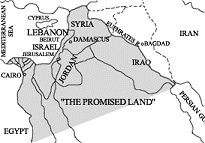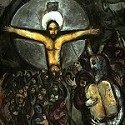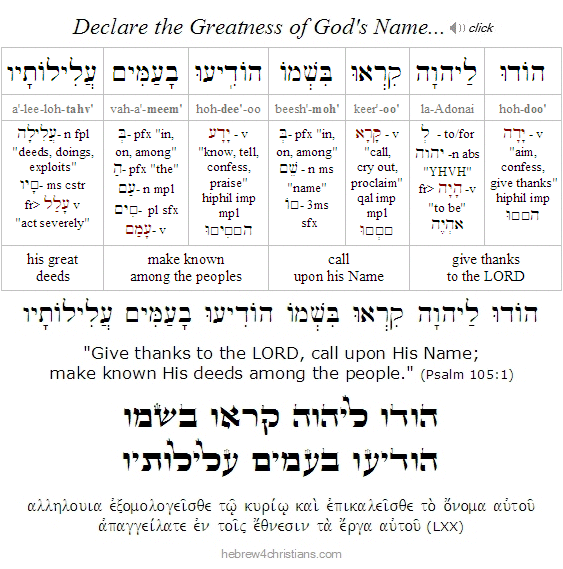|
In our Torah portion this week (Parashat Toldot) we learn that the oath of blessing that God gave to Abraham was extended (exclusively) to his son Isaac (and not to Ishamel, the son of Hagar the Epyptian). Sometime after the death of Abraham (and following Esau's sale of his birthright to Jacob), there was a famine in the land, and Isaac and his family departed to Gerar (in the southwest) to find food. On the way the LORD appeared to him and said: "Do not go down to Egypt; dwell in the land which I will tell you; remain a stranger in this land. I will be with you and will bless you, since to you and to your offspring I will give all these lands, and I will establish the oath (שְׁבוּעָה) that I swore to Abraham your father. I will multiply your offspring as the stars of heaven and will give to your offspring all these lands. And in your offspring (זַרְעֲךָ) shall all the nations of the earth be blessed, because Abraham obeyed my voice and kept my charge, my commandments, my statutes, and my laws" (Gen. 26:2-5).
עֵקֶב אֲשֶׁר־שָׁמַע אַבְרָהָם בְּקֹלִי
וַיִּשְׁמֹר מִשְׁמַרְתִּי מִוְֹותַי חֻקּוֹתַי וְתוֹרֹתָי
ei'·kev a·sher - sha·ma · Av·rah·hahm · be·koh·lee
vai·yeesh·mohr · meesh·mar·tee · meetz·voh·tai · choo·koh·tai · ve·toh·roh·tai

"Because Abraham obeyed my voice and kept my charge,
my commandments, my statutes, and my laws" (Gen. 26:5)
So great was the reward of Abraham's obedience regarding the Akedah (the offering of his son Isaac) that God literally ordained the future of the Jewish people and the coming of the Savior of the world through him. Please pause over that thought.... Previously the LORD had said (אמר) that he would make Abraham into a great nation with innumerable descendants (Gen. 13.16). Later God reaffirmed his promise by asking Abraham to "look toward heaven, and number the stars, if you are able to number them... so shall your offspring be." Abraham believed God's word, and the LORD regarded his faith as righteousness (Gen. 15:5-6). The LORD then sealed His promise to Abraham by means of the (unilateral) "covenant between the parts" (בְּרִית בֵּין הַבְּתָרִים) and then foretold of the 400 year long exile of Israel (in Egypt). Nevertheless, the LORD promised to give to his descendants the Promised Land, which extended "from the river of Egypt to the great river, the river Euphrates" (Gen. 15:18).
 |
Still later, when Abraham was 99 years old, the LORD ordained the covenant of brit milah (ritual circumcision, lit. "covenant of the word") based on Abraham's trust in God's promise that he would be the father of his own biological son and heir (Gen. 17:1-22). But notice that all these earlier promises were a prelude to the greater oath of blessing to come. It was only after the Akedah that God swore an oath (שְׁבוּעָה) that through the Seed of Abraham would all the families of the earth be blessed:
By myself I have sworn, declares the LORD, because you have done this and have not withheld your son, your only son (ben yachid), I will surely bless you, and I will surely multiply your offspring as the stars of heaven and as the sand that is on the seashore. And your offspring shall possess the gate of his enemies, and in your offspring shall all the nations of the earth be blessed, because you have obeyed my voice" (Gen. 22:16-18; cp. Gal. 3:9,16).
Consider the connection between the oath of blessing and Isaac. The Jewish people are alive today because Abraham was willing to sacrifice his only begotten son in faithful obedience before God.... The phrase, "by myself have I sworn" (בִּי נִשְׁבַּעְתִּי) is the most solemn oath God could make and must be regarded as an inviolable vow (Gen. 26:16-17, cp. Heb. 6:13-18). The Targum Yonatan reads, "By my Word have I sworn, says the Lord, because you have done this thing, and have not spared your only son... that all the peoples of the earth shall be blessed through the righteousness of your son, because you have obeyed My word."
What was the reason for this tremendous promise and blessing given to Abraham? In a word: his faithful obedience to the Word of the LORD. When the LORD extended the oath of blessing to Isaac, He said: "And in your offspring (זַרְעֲךָ) shall all the nations of the earth be blessed, because Abraham obeyed my voice and kept my charge, my commandments, my statutes, and my laws" (Gen. 26:2-5). In other words, it was Abraham's obedience - supremely tested by the decree to sacrifice his own son - that led to the irrevocable oath of the LORD God Almighty (אֵל שַׁדַּי).
It is interesting that the sages of the Talmud understood the merit of Abraham in terms of his obedience to the Sinai covenant (i.e., the law of Moses) rather than through the Torah of faith. They interpret the verse: "Because Abraham obeyed my voice, and kept my charge, my commandments, my decrees, and my laws" to mean that Abraham obeyed all "613 laws of the Torah" -- even before they were revealed at Sinai 400 years later (Yoma 28b).
Strictly speaking their conclusion is unwarranted, of course, since it is preposterous to think that Abraham literally observed all 613 laws of the Torah given at Sinai. After all, many of these laws pertained exclusively to women (e.g., laws of niddah), to slaves (laws of redemption), to lepers (laws of tza'arat), to priests (laws of sacrifice), to Levites (laws of the Tabernacle), to farmers (laws of ma'aser), to judges (laws of justice), to soldiers (laws of warfare), and so on. It is better to read the verse in context and to bear in mind that the word Torah refers to God's instruction or revealed will, which obviously predated the law given at Sinai (more here). Nevertheless Abraham heard (שָׁמַע) the Voice of the LORD and obeyed all of God's instructions, commandments and "decrees" (i.e., those commandments that defied his rational understanding). Indeed, the consummate example of a decree (chok) was God's request that Abraham sacrifice his exclusively appointed and promised heir as a burnt offering on Mount Moriah, and yet it is precisely because Abraham obeyed this decree that the oath of blessing was given. In other words, it was the sacrifice of the promised seed that brought about God's unchanging oath - not the pledge to keep covenantal laws later given at Sinai. Put the other way around, all the "commandments, decrees, and laws" were fulfilled by Abraham because he heard God's voice and trusted in the sacrificial death and resurrection of his "only begotten" son, and this is surely a prefigurement of the justification imparted by faith in the gospel message itself (Heb. 11:17-19; Gal. 3:8,16-18; John 3:16).
The very existence of Israel and of the Jewish people derives from
nothing less than the sacrifice of the Promised Seed...
As I have mentioned elsewhere, the first occurrence of the word "love" in the Bible (אַהֲבָה) concerns Abraham's love for his "only begotten" son Isaac, whom he willingly offered as a sacrifice on Moriah. Abraham "built the altar," "laid the wood in order," "bound his son," and "laid him on top of the wood" to foreshadow the sacrifice of the Promised Seed to come... The Akedah is truly the "Gospel according to Moses."
Jewish tradition completely misunderstands the significance of the Akedah. The story of Abraham's supreme test of faith is recited every morning as a prelude to Shacharit (morning) services and at the start of every Jewish year (i.e., Rosh Hashanah). Perhaps the motivation for doing so is to connect the passion of Abraham's sacrifice with the passion to live a characteristically Jewish life. Nonetheless it is nothing short of astounding to realize that the very existence of the Jewish people - and the coming of the Messiah himself - derives from Abraham's willingness to sacrifice his "only begotten son." Abraham's faith in God's promise constitutes a "deeper Torah" than that given at Sinai....
The ultimate message of the Akedah is that the sacrifice of the Promised Seed gives life to Israel - and to all who likewise share the faith of Abraham, the father of all who trust in God's promises (Rom. 4:11-22). Israel did not become a nation at Sinai but rather was born out of the sacrifice of the promised seed. This is why Paul made the point that the promise of blessing - received by faith - predated the giving of the law:
For the promise to Abraham and his offspring that he would be heir of the world did not come through the law but through the righteousness of faith. For if it is the adherents of the law who are to be the heirs, faith is null and the promise is void. For the law brings wrath, but where there is no law there is no transgression. That is why it depends on faith, in order that the promise may rest on grace and be guaranteed to all his offspring -- not only to the adherent of the law but also to the one who shares the faith of Abraham, who is the father of us all, as it is written, "I have made you the father of many nations" -- in the presence of the God in whom he believed, who gives life to the dead and calls into existence the things that do not exist. (Rom. 4:13-17)
Just as Abraham was declared righteous by trusting in the promises of God (symbolized by the sacrifice of his son), so are we made partakers of his blessings by trusting in the One who sacrificed His only begotten Son and raised Him from the dead.
May the Name of Yeshua our LORD be exalted forever and ever...
Hebrew Lesson
Psalm 105:1 reading (click):
|




